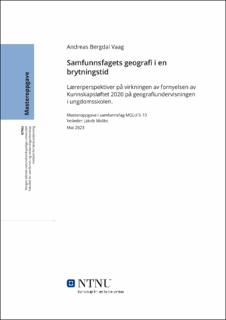| dc.contributor.advisor | Maliks, Jakob. | |
| dc.contributor.author | Bergdal Vaag, Andreas. | |
| dc.date.accessioned | 2023-07-12T17:22:24Z | |
| dc.date.available | 2023-07-12T17:22:24Z | |
| dc.date.issued | 2023 | |
| dc.identifier | no.ntnu:inspera:147067678:39520902 | |
| dc.identifier.uri | https://hdl.handle.net/11250/3078487 | |
| dc.description.abstract | I skoleåret 2020-21 ble det innført en ny læreplan for 1.-9. trinn i grunnskolen. Året etter ble den også innført for 10. trinn. Den nye læreplanen i samfunnsfag hadde ved første øyekast fjernet betydelige deler av geografifaget fra læreplanen. I denne masteroppgaven ønsker jeg å få et innblikk i hvordan lærerne reflekterer rundt dette. Derfor har jeg formulert følgende problemstilling: «Hvordan forstår dagens samfunnsfaglærere på ungdomsskolen geografiens plass i samfunnsfaget etter Fagfornyelsen 2020?».
Litteraturen jeg har brukt i oppgaven er hentet fra forskning av sentrale geografer som Sætre, Holt-Jensen, og Eidsvik, samt Jegstad og Ryen. Jeg har i tillegg studert og sammenlignet geografi- og samfunnsfaget i læreplanene Kunnskapsløftet LK06 og Kunnskapsløftet LK20. Her har jeg brukt forskning av Gilje, Landfald og Ludvigsen, samt en evaluering av Fagfornyelsen utarbeidet av Universitetet i Sørøst-Norge for sammenligning og analyse.
For å få innsikt i dette temaet har jeg intervjuet tre erfarne samfunnsfaglærere, med henholdsvis 14, 17 og 35 års erfaring fra skolen. Lærerne har formell utdannelse innenfor samfunnsfag, som tilsier at de oppfyller kravet på minimum 30 studiepoeng i samfunnsfag.
Basert på spørsmålene jeg stiller, får jeg innblikk i lærernes refleksjoner over Fagfornyelsen, brudd eller kontinuitet for geografifaget i skolen, bruk av geografiske kilder og eventuell endring av egen undervisning. De forteller samtidig om deres refleksjoner rundt mer bærekraftig utvikling i læreplanen.
Av sentrale funn så vil jeg trekke frem at lærerne synes at geografifaget er svekket, og de savner mer konkret kunnskap i samfunnsfaget. De mener at kompetansemålene er mer åpne enn før, men at de samtidig kan være vanskelig å forholde seg til, både for elever og lærere. Samtidig mener de at det i større grad legges opp til at læreren selv velger hva de vil vektlegge i undervisningen, noe som kan føre til store variasjoner. I tillegg til den nye læreplanen, har større tilgang til digitale verktøy vært med på å endre lærernes undervisning. | |
| dc.description.abstract | In the 2020-21 school year, a new curriculum was introduced in primary school for grades 1-9. The following year it was also introduced for the 10th grade. At first glance, the new curriculum in Social Studies had removed significant parts of geography from the curriculum. In this master’s thesis, I want to gain an insight into how the teachers reflect on this. Therefore, I have formulated the following question: “How do todays secondary school social studies teachers understand geography’s place in social studies after the Subject Reform 2020?”
The literature I have used in this thesis is taken from research by key geographers such as Sætre, Holt-Jensen and Eidsvik, as well as Jegstad and Ryen. I have also studied and compared the geography and social studies subjects in the two Norwegian curriculums LK06 and LK20. I have used research by Gilje, Landfald and Ludvigsen, as well as an evaluation of the Subject Renewal prepared by the University of Southeast Norway in the comparison and analysis.
To gain insight into this topic, I have interviewed three experienced social studies teachers, with respectively 14, 17 and 35 years of school experience. All three teachers have formal education in social studies, which indicates that they meet the requirement for a minimum of 30 credits in social studies.
Based on the questions I ask, I get an insight into the teachers’ reflections on the Subject Renewal, breach or continuity for the geography subject in the curriculum, the usage of geographical sources, as well as possible changes to their own teaching. In addition, the teachers talk about their reflections on more sustainable development in the curriculum.
Of the key findings, I would like to point out that the teachers thinks that the geography subject is weakened, and they miss more concrete knowledge in the social science. They believe that the competence goals are more open than before, but at the same time they can be difficult to deal with, both for pupils and teachers. They also believe that in a greater extent it is for the teachers to decide what they want to emphasize in their teaching, which can lead to large variations. In addition to the new curriculum, a greater access to digital tools has helped teachers in changing their teaching. | |
| dc.language | nob | |
| dc.publisher | NTNU | |
| dc.title | Samfunnsfagets geografi i en brytningstid. Lærerperspektiver på virkningen av fornyelsen av Kunnskapsløftet 2020 på geografiundervisningen i ungdomsskolen. | |
| dc.type | Master thesis | |
